A long-time theater critic and her fellow members of the Connecticut Critics Circle share the realities of their profession: scribbling notes in the dark (electronic devices cast a light), enduring shows that never should have made it to the stage, and celebrating the industry at Connecticut’s version of the Tony Awards.
“You have such a fun job,” people are always enviously remarking when they learn that I’m a theater critic.
Yes, I agree. It is a fun job. I get to experience a potpourri of world-class theater right here in Connecticut and be moved to laughter or tears by comedies and riveting dramas; rocked by marvelous musicals; awed by magical sets and costume designs; invigorated by emerging young playwrights’ progressive, thought-provoking new works; and excited by reinterpretations of classic masterpieces.
On the other hand, I also have to take notes in the dark, paying rapt attention to every nuance of what’s happening on stage and how all the elements interact—from acting to directing to lighting to choreography.
And, if a production turns out to be a disappointment and is interminably long to top it off, I can’t sneak out at intermission but must keep myself from nodding off in my seat until the bitter end.
Then I have to write my review on deadline, trying to decipher the notes I took in a pitch-black theater. I spend hours reflecting, researching, and writing in order to create a balanced, fair, and insightful review that will resonate with my readers because I take my responsibility to both potential audiences and the theaters very seriously.
A bad review could seriously hurt ticket sales, which, in turn, hurts the theater’s profitability. On the other hand, it’s important to be honest with readers, as theater tickets are not inexpensive. Of course, I’m always pleased when I can give a rave review because everyone benefits: the theater, the actors, and the audience.
About 14 years ago, I happily discovered that there was a group of critics who had formed the Connecticut Critics Circle (CCC) as a way for those of us in this often lonely pursuit to come together, communicate, share ideas, post our reviews all in one place online, and celebrate Connecticut theater at an awards ceremony held every spring.
Founded in 1990, the organization has grown from a handful of critics to more than two dozen. Our awards ceremony—originally held in libraries, church basements, and critics’ homes with between 30 and 70 people in attendance—has grown into a full-blown theatrical production. Held most recently at Hartford Stage, the glamorous occasion featured professional lighting, sound, and projections; live entertainment; engraved awards (versus paper certificates); celebrity presenters; and more than 350 attendees.
Our all-volunteer organization recently achieved nonprofit status, enabling us to raise needed funds to keep future awards ceremonies equally high-caliber.
CCC members live in all corners of Connecticut and along the Shoreline. Many review both Connecticut and New York shows. They come from a wide and impressive range of backgrounds. We have journalism, English, and drama professors among us (several have PhDs in theater or literature), as well as those who have written, performed in, directed, and produced plays and musicals.
To qualify for dues-paying CCC membership, applicants must submit proof of annual publication of at least five reviews—print or electronic—of productions at no less than four different theaters. To maintain active status, current members must write three reviews of shows at three different theaters. The membership chairperson determines if reviews by CCC applicants meet the organization’s standards of quality.
Members of the CCC receive invitations from all of the theaters we review to attend press opening nights, and there is an implicit understanding that offering us complimentary tickets in no way influences our reviews.
Though Connecticut’s award-winning theaters are familiar to Seasons readers, the CCC is a lesser-known entity. To illuminate life in front of the curtain—that is, from the seats of our statewide critics who review about 60 productions annually—I asked my colleagues to weigh in on the realities of our profession. Here’s an excerpt from our discussions:
AB: Why do you feel strongly about the importance of our organization and being an active participant?
KI: I like the idea of talking to colleagues, sometimes arguing, or just having energetic discussions about our different opinions, and I learn from them and hopefully they learn something from me. We all have a mutual goal: We love theater; we want people to enjoy theater; we want people to go to theater.
GD: I initially got involved for the same reasons as Karen—because it’s good to sit and talk and mingle with fellow critics. I’ve stayed because of that but also because of how the organization has expanded, and what truly intrigues me is what we’ve been able to accomplish and what we might be able to accomplish in the future. It’s kind of exciting.
FR: What drew me to the organization is what I could add to it in terms of the annual awards event. It’s a celebration of theater in Connecticut, and if you want emotions on stage, you don’t have to go to Indecent or A Moon for the Misbegotten or Angels in America: You just come to the annual show, and you see beautiful, heartfelt acceptance speeches by actors, designers, writers, performers, directors…. They work for very little, are sometimes unappreciated, and we’re able to say “thank you” and reward them in some way.
AB: What are the upsides and downsides of being a theater critic today?
KI: One challenge is that too many media outlets are eliminating reviewers. I think the public appreciates some guidance. Not that they always agree with us, but they at least see our perspective, and it may help them decide where to spend their limited entertainment dollars. The great thing is you see a lot of really wonderful theater. The downside is you often see productions that disappoint you in one way or another, and you just wish they were better. The amateur critics are focusing in on film—that’s an easy venue. We’re offering, by and large, well-thought-out reviews of productions by professionals we respect.
GD: When I first started as a theater critic and had to write my first negative review, it was agonizing until I realized that my function is as an advocate for theatergoers. And, if I don’t tell the truth, then I’m not doing my job. And, by and large, the public appreciates our expertise as professional theater reviewers. The second thing, as Karen mentioned, is because there are so few publications publishing reviews these days, the theaters really rely on us. The CCC mantra is: “In support of theater in Connecticut.” And one of the ways you support theater is getting the word out, especially when you see something wonderful.
AB: I want people to know how seriously we take reviewing and also how seriously we take the selection of award winners. Any thoughts?
GD: It’s an arduous project. Everyone voices opinions; we give reasons for or reasons against. Is it a perfect system? No, but I think it captures the essence of what we’re attempting to do, which is to award quality.
FR: The problem with Connecticut is the range of where our critics [reside] and the geography of the state. Because of the local publications they may be writing for, they may not be able to see everything. However, [the awards committee] is charged with seriously taking the [entire membership’s] opinions into our conversation in deciding who should get the awards.
KI: I think the issue with the awards has always been, to some extent, comparing apples and oranges. Somebody plays Macbeth and is brilliant. And then there is somebody who is in a fluffy comedy and is also brilliant. How do you equate those two and come to a decision as to who was best in his or her role? There is a lot of diversity of opinion.
AB: That’s for sure. We’ve had meetings to select the nominees that have gone on longer than three hours. It’s like being locked in a jury.
KI: Or a bag of kittens. I think sometimes you wonder if you saw the same production as other people.
GD: That’s the nature of criticism. But although we have different opinions, there is surprising equanimity among us.
FR: In other groups it can be a snake pit. I have to say, I’ve only done this for six years, but the conversations over that table are respectful, detailed, and really fascinating.
AB: Other thoughts on the awards ceremony, as we gear up for our June event?
KI: It’s really interesting to look back and see some of the people who are now stars, like Jessie Mueller. She was a nominee for a CCC award, went on to win a Tony Award for Beautiful, and is now starring inWaitress [on Broadway]. Also, it’s this great opportunity for Connecticut professional theater people, who don’t all get together very often, to see each other in this social setting, to interact with the critics, interact with the public.
GD: From the point of view of those who receive the awards, all you have to do is access the photos from last year’s show and look at the looks on the faces of the recipients, and you’ll see why we do what we do.
FR: And it’s not just critics giving awards to the insiders. The public is invited, and our event has always been free, generously welcoming everyone. It’s really amazing: Outside New York and Chicago, the Connecticut market is one of the top five in terms of creating national- and international-quality work.
Amy J. Barry is a seasoned freelance writer and expressive arts educator who lives in Stony Creek. For more about Amy, visit aimwrite-ct.net.
Photography by Mara Levitt
Visit ctcritics.org for information about the spring 2017 awards ceremony. The event is open and free to the public, but RSVPs are requested.



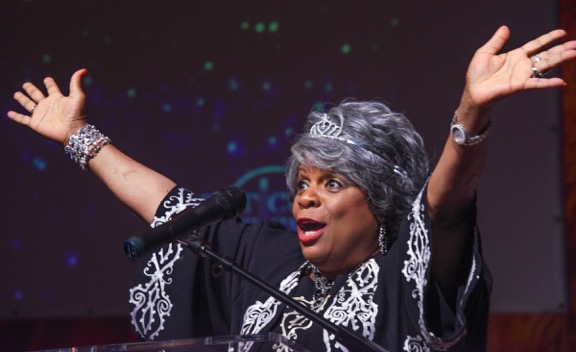

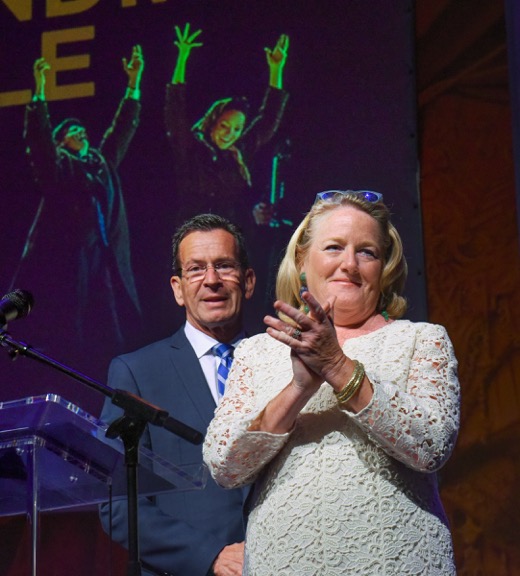
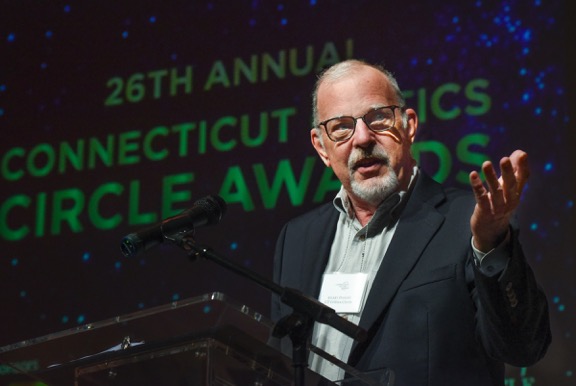
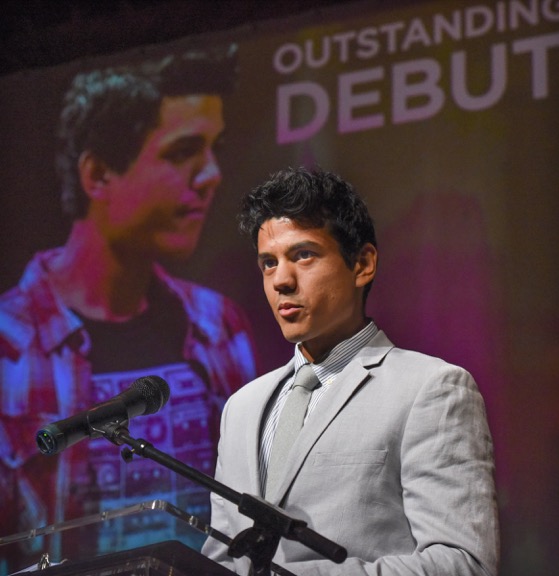

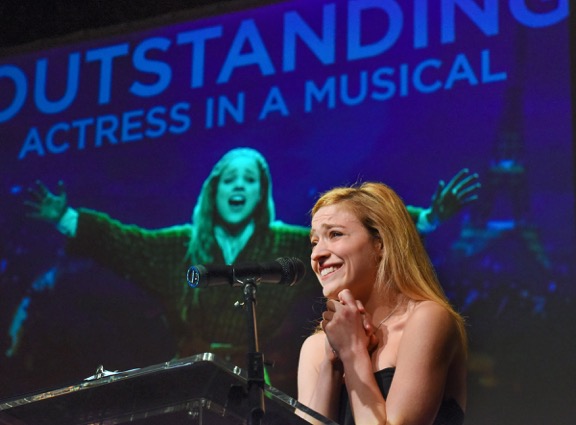
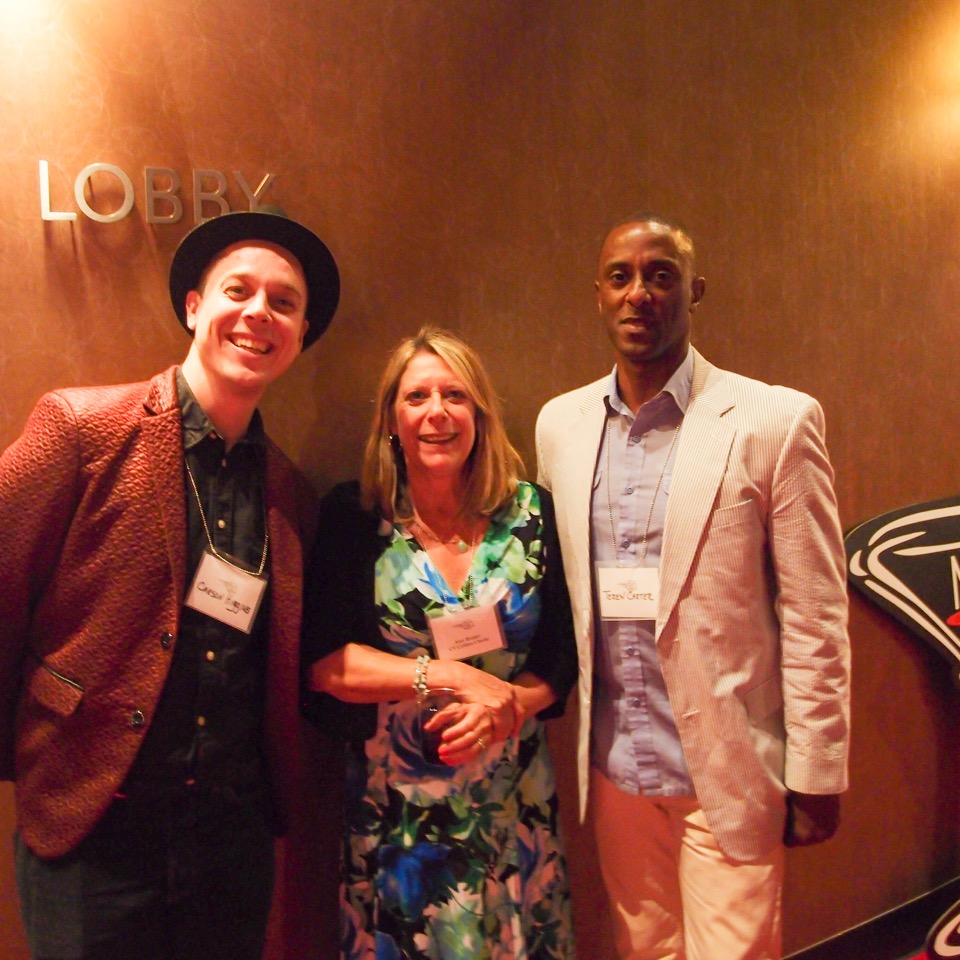
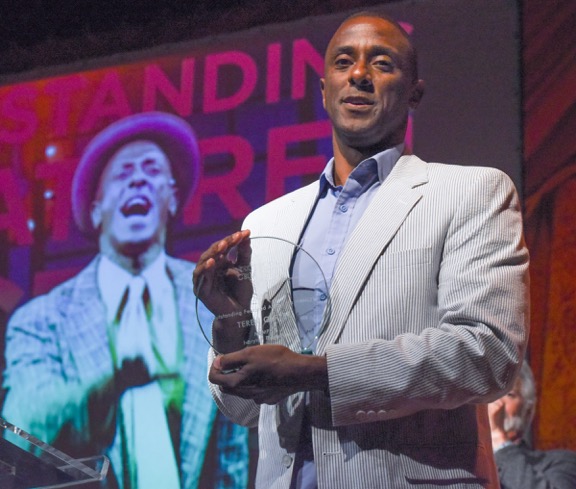


More Stories
Fall Arts Preview: Emus, Foxes and Eric Clapton, Too
Wadsworth Atheneum Museum of Art: (Un)Settled Art Exhibition Moves Beyond Classic Landscapes
On Stage and Off, With Photographer James Meehan